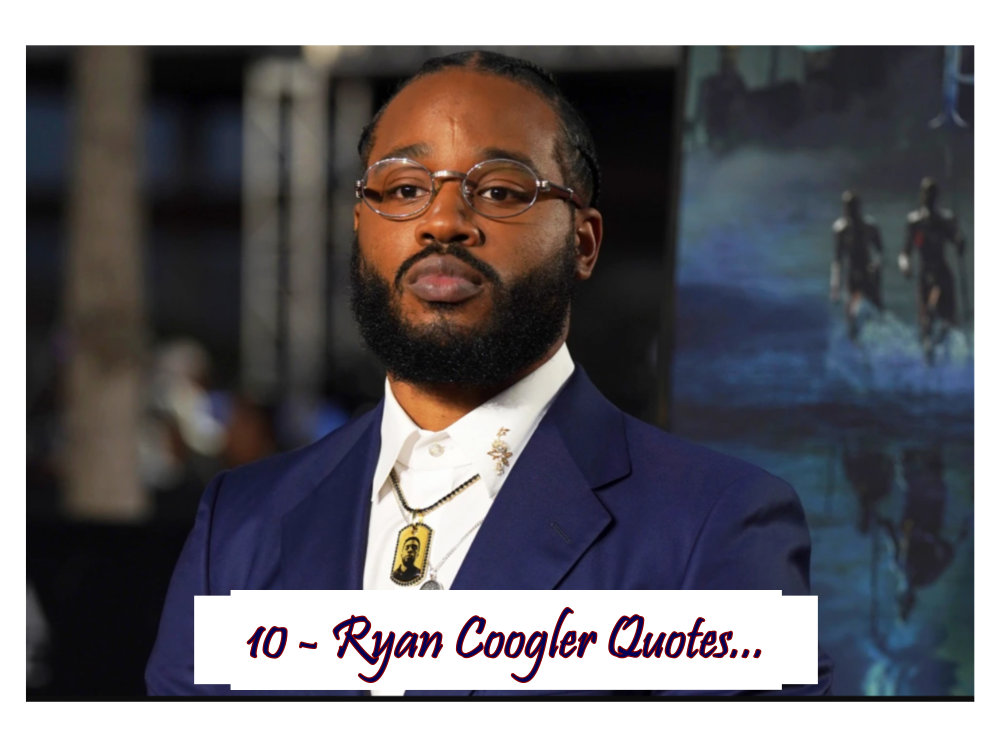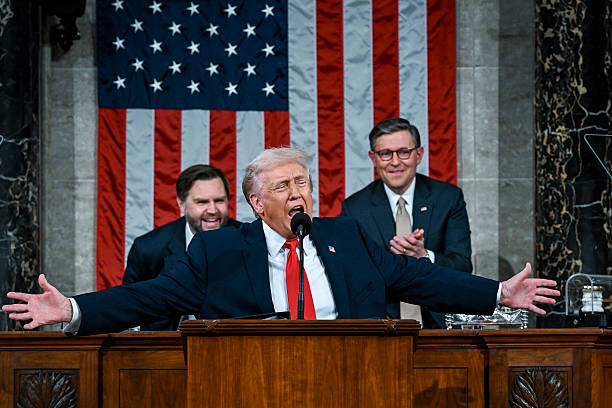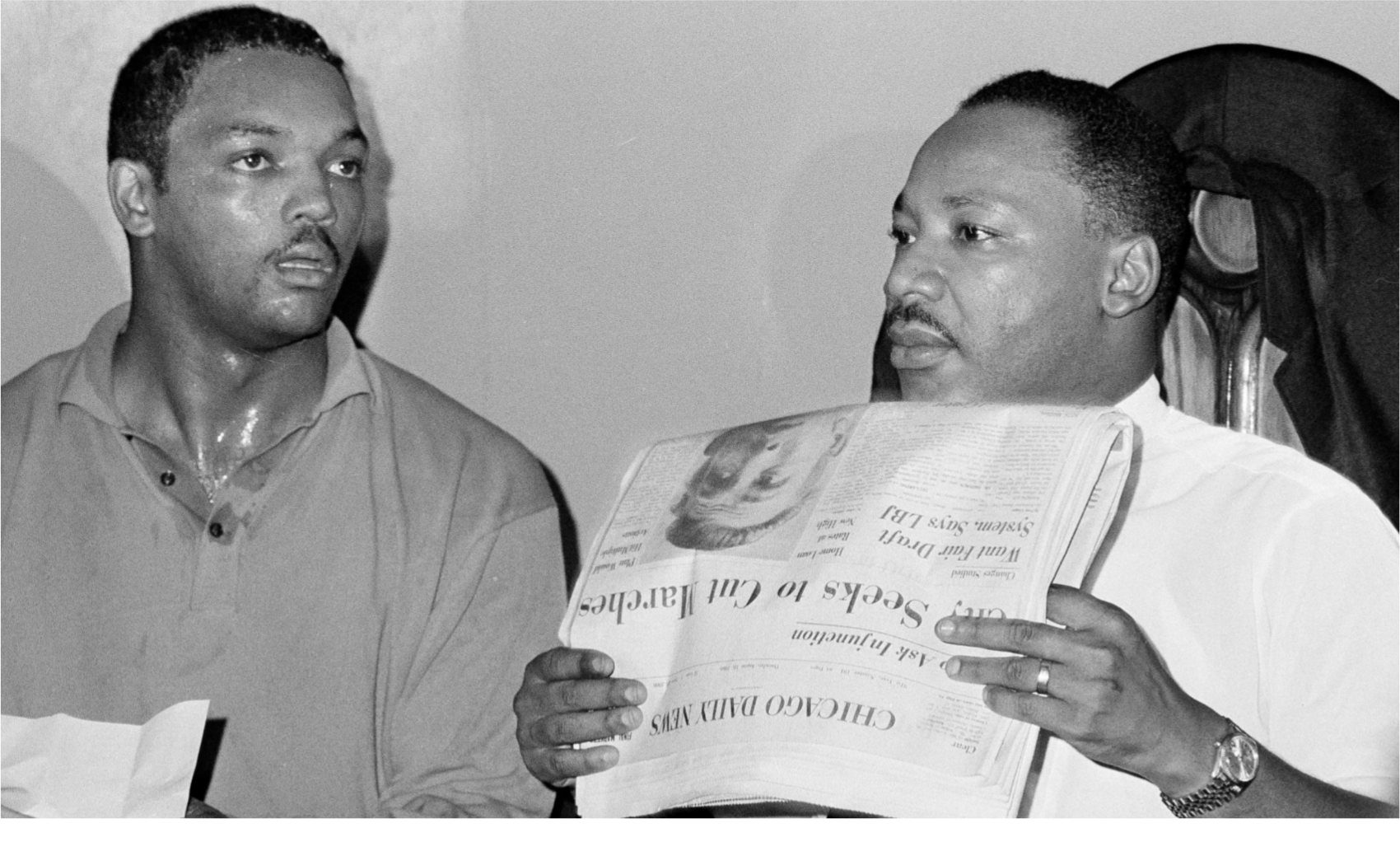(ThyBlackMan.com) When you look at the kind of stories Ryan Coogler tells, you quickly realize he’s not just making movies—he’s leaving a mark on culture. From Fruitvale Station to Creed, Black Panther, and now the 2025 box office giant Sinners, Coogler has proven time and again that he’s one of the most thoughtful and impactful filmmakers of our time. Sinners is already a massive success, pulling in over $320 million worldwide off a $90 million budget. And get this—it’s just $31 million shy of becoming one of the top 10 highest-grossing R-rated movies at the domestic box office, poised to overtake The Hangover.
But here’s the thing: as incredible as his films are, what really sticks with you are the words behind the camera. Coogler has a way of speaking—about art, purpose, identity, and legacy—that makes you pause and reflect. These 10 quotes aren’t just inspiring; they’re guiding lights for anyone trying to create something meaningful in a noisy world.

1. “You want to tell stories that have the power to affect people. To make them feel seen.”
This quote encapsulates Coogler’s entire artistic mission. His body of work has consistently focused on elevating voices and narratives that often go unheard. From the tragic true story of Oscar Grant in Fruitvale Station to the Afro-futuristic empowerment of Black Panther, Coogler aims to do more than entertain—he seeks to affirm identity.
In a world where many feel erased or misrepresented, the ability to “feel seen” is no small feat. In 2025, the media landscape remains crowded and often performative, but Coogler’s quote challenges creators to ask deeper questions: Who is this for? Does this reflect someone’s truth? His words urge us to tell stories that resonate, stories that restore dignity.
And it’s not just about representation on screen—it’s about representation in the narrative soul of the work. Feeling seen means recognizing your own complexity in the characters portrayed. Coogler’s films don’t flatten people into tropes; they breathe life into experiences that are layered, sometimes painful, and often beautiful. He gives the spotlight to characters who are rarely the center of attention in mainstream media—and that intention has created a ripple effect across Hollywood.
Feeling seen is more than just visibility—it’s about emotional accuracy. Coogler’s insight is a call to action for any writer, filmmaker, or artist looking to make a lasting, authentic impact. In a time when people are yearning for truth and belonging, storytelling that centers humanity—rather than spectacle—is not just needed, it’s necessary.
2. “I think the best directors are the best listeners.”
This quote speaks volumes about leadership in any creative field. For Coogler, filmmaking isn’t just about vision—it’s about collaboration. His willingness to listen has made him beloved by actors and production teams alike. It’s no coincidence that Michael B. Jordan, Lupita Nyong’o, and others consistently work with him. They trust him because he respects them—not just as performers, but as people.
Listening is the backbone of great direction, and it requires humility. Coogler enters the room with a plan, yes, but he also enters with openness. That balance between structure and flexibility is what transforms a good film into a deeply human experience. It allows scenes to evolve organically, characters to find their emotional core, and stories to unfold with nuance.
In today’s world, where ego often overshadows empathy, Coogler’s approach is refreshing. Listening fosters trust, deepens relationships, and invites innovation. Whether you’re leading a team at work, guiding a classroom, or organizing a community project, this mindset applies far beyond the movie set. It’s about understanding that the best ideas often come from the people you’re working alongside.
Especially in 2025, when remote and hybrid collaborations are the norm, listening has become even more critical. Miscommunication is easier, and assumptions can fracture momentum. Coogler reminds us that leadership begins with understanding—not authority. His quote should be printed on the wall of every boardroom, studio, and Zoom call. Because in a world craving connection, listening is the most powerful tool we have.
3. “There’s something powerful about seeing yourself as a hero. It changes what you think you’re capable of.”
This quote, often cited in discussions about Black Panther, underscores the psychological impact of representation. When children and adults alike see heroes who look like them, speak like them, and come from familiar backgrounds, the possibilities of what they can achieve expand exponentially. It’s not about fantasy—it’s about permission. The kind of permission that tells you, “You belong here too.”
T’Challa, Shuri, Killmonger, Nakia—these were not sidekicks or comic relief characters. They were brilliant, brave, conflicted, and charismatic. They were written with care and portrayed with depth. Coogler created a cinematic world where Blackness wasn’t peripheral—it was central, powerful, and multi-dimensional. For many, it was the first time they saw themselves at the center of a global cultural phenomenon.
In an era still grappling with inequality, Coogler’s words remain a compass. This is especially relevant in education and media, where the narratives young people absorb shape their ambitions. When a young girl sees a scientist like Shuri or a warrior like Okoye, she doesn’t just admire them—she starts to wonder if she could be them. By broadening the definition of who gets to be a hero, Coogler is redefining empowerment.
This quote also speaks to mental health and self-worth. Representation doesn’t just influence what you want to do—it shapes what you believe you deserve. In this light, Coogler’s cinema is more than storytelling; it’s self-affirmation. It says, “You matter. You are enough. And yes, you can be the hero of your own story.”
4. “Our job is to reflect the world, but also imagine what it could be.”
Coogler here threads the line between realism and imagination. As a filmmaker, he’s unafraid to depict harsh realities—racism, poverty, violence—but he also dares to dream. This dual lens makes his work both grounded and visionary. He understands that change requires both clarity and hope—seeing what is and still believing in what could be.
Fruitvale Station held up a mirror to systemic injustice. Black Panther imagined what Africa could look like without colonization. Creed reimagined legacy and identity within a beloved franchise. And in his latest hit, Sinners, Coogler paints a layered portrait of morality, showing that redemption isn’t just a plot device—it’s a daily struggle for many in real life. Each film reflects society but also nudges it forward, asking: “What if we did better?”
The quote resonates deeply with today’s artists and thinkers who are trying to balance truth-telling with hope. In a time of political division, climate crisis, and cultural shifts, it’s tempting to either sugarcoat or catastrophize. Coogler’s wisdom reminds us that true art holds space for both critique and possibility. It speaks truth to power while planting seeds for a better tomorrow.
This sentiment is especially timely as society debates the future of tech, justice, and equity. Coogler invites us to not just mirror what is—but to mold what could be. That’s the job of not only artists but also activists, educators, and leaders. Because what we imagine today sets the boundaries—or breaks them—for what’s possible tomorrow.
5. “My mom and dad worked tirelessly to make sure we had everything we needed. That’s something that always stuck with me.”
This quote sheds light on Coogler’s deep respect for family and sacrifice. It’s more than a sentimental nod—it’s a blueprint for how he carries himself, both professionally and personally. It’s clear that his parents’ work ethic didn’t just provide him with material support; it grounded him with values that continue to shape his choices. His gratitude is quiet but unwavering—and it runs like a current through all of his work.
In 2025, when generational struggles are being unpacked more publicly than ever before—from economic hardship to mental health burdens—this reflection hits home for many. It reminds us that behind every success story, there’s often a support system doing the unseen labor. His words encourage today’s creatives and professionals to take stock of the sacrifices made on their behalf, whether by parents, guardians, mentors, or entire communities.
It’s also a reminder to slow down and pay respect—to understand that our wins aren’t just personal victories, but culminations of ancestral effort. That kind of perspective breeds humility. In an industry where fame can breed entitlement, Coogler’s rootedness in gratitude is both rare and refreshing.
Success, for him, isn’t just about what he achieves—it’s about honoring where he came from. And in a world often obsessed with the next step, that grounded approach reminds us to never lose sight of the people who lifted us up when we were still finding our footing.
6. “I’m learning how to pick projects that I believe in, that are worth the time and energy.”
This quote reflects Coogler’s growing wisdom in curating a career rooted in passion rather than pressure. In a space where every big-name studio wants a piece of him, he’s learning the art of saying no. That takes discipline—and vision. For Coogler, the goal is never just to stay relevant. The goal is to stay real. And that means choosing stories that matter.
A perfect example is his decision to greenlight Sinners, a film that was risky in tone, intense in subject matter, and emotionally heavy. Still, he moved forward because it aligned with his evolving values as a storyteller. Sinners didn’t come out of commercial obligation—it came from personal resonance. And the payoff? A worldwide box office haul that’s exceeded $320 million, plus real cultural conversations being had around its themes.
For creatives, professionals, and entrepreneurs alike, this quote serves as a litmus test: Is what you’re doing worth your energy? Does it reflect who you are and what you care about? In 2025, hustle culture is still loud, but more people are realizing that burnout is not a badge of honor. Coogler’s wisdom reminds us that meaningful work comes not from doing everything—but from doing the right things.
By picking only what aligns with his voice and values, he models the kind of intentional leadership that others are increasingly striving for. In a world that rewards speed, Coogler values depth—and that makes all the difference.
7. “You don’t make a movie to make a statement, you make a movie to tell a story.”
Coogler’s artistic integrity shines through here. In a media environment often filled with on-the-nose messaging and overly politicized narratives, his approach feels like a breath of fresh air. He isn’t interested in preaching—he’s interested in portraying. And in doing so, he trusts the audience to find the message within the moment, the movement, the emotional arc.
This quote doesn’t mean Coogler is apolitical or neutral—far from it. His films are filled with powerful themes: systemic racism, grief, legacy, redemption. But he lets the characters carry those messages through lived experiences rather than monologues or exposition. Whether it’s Adonis Creed struggling with his father’s shadow or Killmonger raging against injustice, the statements are there—but they come from the story, not above it.
In other disciplines—education, public speaking, even leadership—this quote holds weight. Let the experience teach. Let the journey show the lesson. Coogler believes in trusting the intelligence of the viewer, the reader, the listener. That’s a powerful form of respect.
At a time when some creators feel pressured to be overtly political or socially correct, Coogler offers an alternative: tell the truth through narrative. Let people feel it, rather than force them to hear it. That’s how real impact sticks.
8. “Representation is important, and people want to see themselves.”
Few quotes sum up the cultural movement of the past decade as succinctly as this one. Coogler’s Black Panther was more than a blockbuster—it was a revolution. It shattered ceilings not just in terms of box office performance, but in how Blackness, Africanness, and cultural pride were centered and celebrated on a global scale. For millions around the world, that film was the first time they saw themselves as royalty, as innovators, as heroes.
But this quote isn’t just about superheroes. It applies to every corner of life where people long to feel recognized—media, education, business, fashion, even politics. When people see themselves reflected in spaces where they were once invisible, it sends a powerful message: You belong here. You are not an exception. You are part of the story.
In 2025, this conversation continues to evolve. People are no longer satisfied with tokenism—they want authenticity. They want depth. Coogler’s quote underscores that representation isn’t just a checkbox—it’s a mirror. And when it’s accurate and thoughtful, it can heal, inspire, and mobilize.
He also reminds us that representation is a responsibility, not just a creative flourish. Who you include, how you include them, and the care you take in telling their story—it all matters. Because people aren’t just watching. They’re seeing themselves, and they’re taking it personally.
Coogler’s legacy, in part, is that he helped shift the standard. Representation is no longer seen as extra—it’s essential. And as his films continue to succeed, he proves that stories rooted in truth don’t just resonate—they thrive.
9. “As a filmmaker, my job is to ask questions, not to give answers.”
In a time overwhelmed by opinions, hot takes, and endless streams of information, this quote is a refreshing reminder of the role of art as inquiry. Coogler understands that the best stories open conversations rather than close them. By resisting the urge to be prescriptive, he invites audiences into reflection, not just reaction. This doesn’t mean his work is neutral—it means it’s layered, thought-provoking, and designed to linger long after the credits roll.
In Black Panther, for instance, he didn’t give us a simple good-versus-evil narrative. Instead, he asked: What does justice look like for the oppressed? Is vengeance ever righteous? What is the cost of isolation versus the responsibility of global engagement? By crafting characters like Killmonger, who walk in moral gray zones, Coogler encourages us to wrestle with difficult questions—questions that don’t have easy answers.
This approach is particularly important now, when polarization often undermines nuance. Whether in film, journalism, classrooms, or social media discourse, asking the right questions can lead to deeper understanding and real progress. In 2025, as society continues to grapple with complex issues—racial justice, climate change, identity politics—what we need more than ever are brave questions that hold space for uncomfortable truths.
Coogler’s quote also resonates beyond art. In leadership, parenting, education, and even personal growth, asking the right questions is often more valuable than having all the answers. It’s a mindset rooted in curiosity and humility—two qualities that are essential if we want to grow collectively. His reminder urges us to make inquiry the engine of insight, not an afterthought.
10. “Sometimes when you’re making something, it’s easy to forget that people are going to see it. But you can’t ignore that—it’s powerful.”
This reflection on accountability and impact is a humbling insight into the creator’s mindset. In the creative process, it’s easy to get lost in the mechanics: camera angles, scripts, edits, deadlines. But Coogler reminds us that the final product—whatever it may be—enters the world and becomes part of someone else’s reality. That’s not just powerful—it’s sacred.
Coogler isn’t just talking about film. This quote applies to anyone who builds, shares, teaches, or leads. Everything we release into the world—an article, a podcast, a post, a speech—has a reach we often underestimate. For a filmmaker, a story might influence how a child sees themselves. For a CEO, a policy might impact hundreds of families. For a teacher, a classroom decision might change a student’s future.
In today’s interconnected world, this quote is a cautionary reminder to be thoughtful and deliberate. Visibility is a gift—but also a responsibility. It’s easy to fall into the trap of assuming people will interpret things the way we intended. But intention doesn’t cancel out impact. Coogler’s awareness of his influence is something every public-facing individual would do well to internalize.
He’s not saying to create with fear—but with awareness. To remember that someone, somewhere, is going to hold what you made in their hands—or their heart. Whether it brings joy, healing, challenge, or change, that encounter is real. It matters. And being mindful of that power isn’t a burden—it’s a privilege. It’s what separates noise from meaning, and output from legacy.
Ryan Coogler doesn’t just direct films—he directs conversations, perspectives, and even the way we see ourselves. His words carry the same weight as his visuals: deliberate, grounded, and full of purpose. Whether he’s talking about grief, leadership, or the importance of being seen, his insights hit home because they come from a place of lived experience and deep reflection.
In a world where it’s easy to get lost in the noise, Coogler reminds us to stay rooted in purpose. These quotes aren’t just for filmmakers or artists—they’re for anyone navigating life with a desire to do meaningful work and connect with others along the way. If you’ve ever felt the need to be reminded of why your voice matters, or why the stories you carry are worth telling, let Ryan Coogler’s words be that reminder.
Staff Writer; Jamar Jackson
This brother has a passion for sports, poetry and music. One may contact him at; JJackson@ThyBlackMan.com.

















Leave a Reply